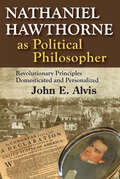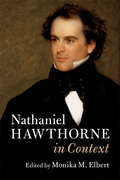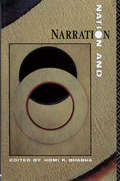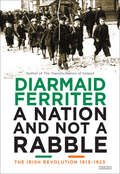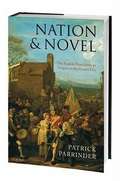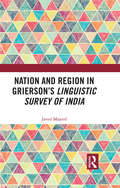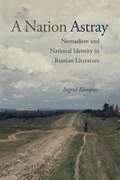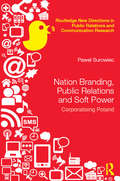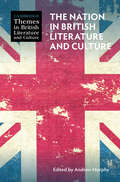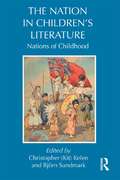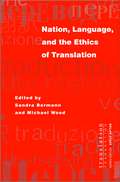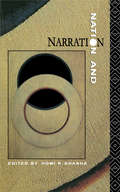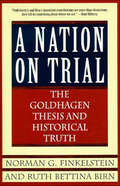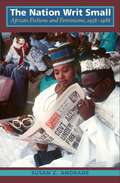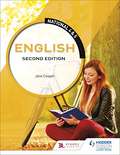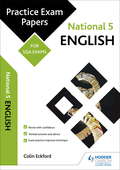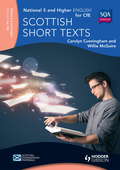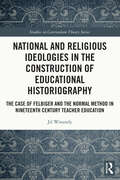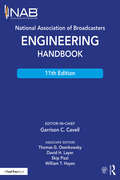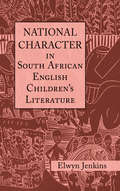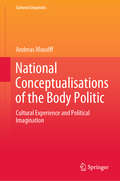- Table View
- List View
Nathaniel Hawthorne as Political Philosopher: Revolutionary Principles Domesticated and Personalized
by John E. AlvisUsing the works of Nathaniel Hawthorne as a case study, John E. Alvis shows that a novelist can be a political philosopher. He demonstrates that much of Hawthorne's works are rooted in the American political tradition. Once we view his writings in connection with the principles expressed in the Declaration of Independence, we grasp that what Thomas Jefferson and John Adams had stated explicitly, Hawthorne's fiction conveys dramatically. With examples drawn from Hawthorne's shorter works, as well as acknowledged classics, such as The Scarlet Letter, John E. Alvis shows that Hawthorne's characters bear something sacred in their generic humanity, yet are subject to moral judgment. He conveys reciprocity between obligations regulating individual relations and the responsibilities of individuals to their community.From America's founding proclamations in the Declaration of Independence we take a sense of national aspirations for a political order that conforms to laws of nature and nature's God. From this higher law emerge the principles enumerated in that revolutionary document. Are these principles confined to the political, or do they reach into the experience of citizens to inform conduct? Do they include family, local community, and individual face-to-face relations with neighbors and strangers? Can one make a distinct way of life by fidelity to such standards as higher law, equality, liberty, natural rights, and consent?This study is distinguished from other writings on Hawthorne in its largely positive focus on America. Alvis characterizes Hawthorne as a rational patriot who endorses America's new terms for human association. This fascinating study provides new insights into the mind of one of the greatest American writers.
Nathaniel Hawthorne In Context (Literature in Context)
by Monika M. ElbertThis volume provides a comprehensive overview of Nathaniel Hawthorne and demonstrates why he continues to be a critically significant figure in American literature. The first section focuses on Hawthorne's interest in and knowledge of past (Puritan and colonial) and contemporary nineteenth-century history (women's, African American, Native American) as the inspiration for his writings and the source of his literary success. The second section explores his fascination with social history and popular culture by examining topics as mesmerism, utopian life styles, theatrical performances, and artistic innovations. The third section looks at how Hawthorne succeeded and excelled in the literary marketplace, as an author of children's literature, literary sketches, and historical romances. In the fourth section, Hawthorne's literary precursors, peers, colleagues, and successors are analyzed. In the final section, Hawthorne's attachment to family, nature, and home is examined as the source of creative inspiration and philosophical questing.
Nathaniel Hawthorne In His Times
by James R. MellowCarefully documented biography and literary analysis.
Nation and Citizenship in the Twentieth-Century British Novel
by Janice HoNation and Citizenship in the Twentieth-Century British Novel charts how novelists imagined changing forms of citizenship in twentieth-century Britain. This study offers a new way of understanding the constitution of the nation-state in terms of the concept of citizenship. Through close readings, it reveals how major authors such as E. M. Forster, Virginia Woolf, Elizabeth Bowen, Sam Selvon, Buchi Emecheta, Salman Rushdie, and Monica Ali presented political struggles over citizenship during key historical moments: the advent of democracy, the emancipation of women, the rise of social-welfare provision, the institution of the security state during World War II, and the emergence of multicultural citizenship during postwar immigration. This serves as the first full-length monograph to map the interrelations between literary production and public debates about citizenship that shaped Britain in the twentieth century.
Nation and Narration
by Homi K. BhabhaBhabha, in his preface, writes 'Nations, like narratives, lose their origins in the myths of time and only fully encounter their horizons in the mind's eye'.From this seemingly impossibly metaphorical beginning, this volume confronts the realities of the concept of nationhood as it is lived and the profound ambivalence of language as it is written. From Gillian Beer's reading of Virginia Woolf, Rachel Bowlby's cultural history of Uncle Tom's Cabin and Francis Mulhern's study of Leaviste's 'English ethics'; to Doris Sommer's study of the 'magical realism' of Latin American fiction and Sneja Gunew's analysis of Australian writing, Nation and Narration is a celebration of the fact that English is no longer an English national consciousness, which is not nationalist, but is the only thing that will give us an international dimension.
A Nation and Not a Rabble: The Irish Revolution 1913–1923
by Diarmaid FerriterThe renowned Irish historian delivers “an excellent scholarly reevaluation” of the 1916 Easter Rebellion and the turbulent decade that followed (Library Journal).On Easter Monday of 1916, the Irish Republican Brotherhood launched an armed uprising against British rule that would continue for six days. But Easter Rising was only the beginning of an ongoing revolutionary struggle. In A Nation and Not a Rabble, Diarmaid Ferriter presents a fresh look at Ireland from 1913-1923, drawing from newly available historical sources as well as the testimonies of the people who lived and fought through this extraordinary period. Ferriter highlights the gulf between rhetoric and reality in politics and violence, the role of women, the battle for material survival, the impact of key Irish unionist and republican leaders, as well as conflicts over health, land, religion, law and order, and welfare.
Nation and Novel: The English Novel From Its Origins To The Present Day
by Patrick ParrinderWhat is "English" about the English novel, and how has the idea of the English nation been shaped by the writers of fiction? How do the novel's profound differences from poetry and drama affect its representation of national consciousness? Nation and Novel sets out to answer these questions by tracing English prose fiction from its late medieval origins through its stories of rogues and criminals, family rebellions and suffering heroines, to the present-day novels of immigration. Major novelists from Daniel Defoe to the late twentieth century have drawn on national history and mythology in novels which have pitted Cavalier against Puritan, Tory against Whig, region against nation, and domesticity against empire. The novel is deeply concerned with the fate of the nation, but almost always at variance with official and ruling-class perspectives on English society. Patrick Parrinder's groundbreaking new literary history outlines the English novel's distinctive, sometimes paradoxical, and often subversive view of national character and identity. This sophisticated yet accessible assessment of the relationship between fiction and nation will set the agenda for future research and debate.
Nation and Region in Grierson’s Linguistic Survey of India
by Javed MajeedGeorge Abraham Grierson’s Linguistic Survey of India is one of the most complete sources on South Asian languages. This book is the first detailed examination of the Survey. It shows how the Survey collaborated with Indian activists to consolidate the regional languages in India. By focusing on India as a linguistic region, it was at odds with the colonial state’s conceptualisation of the subcontinent, in which religious and caste differences were key to its understanding of Indian society. A number of the Survey’s narratives are detachable from its rigorous linguistic imperatives, and together with aspects of Grierson’s other texts, these contributed to the way in which Indian nationalists appropriated and reshaped languages, making them religiously charged ideological symbols of particular versions of the subcontinent. Thus, the Survey played an important role in the emergence of religious nationalism and language conflict in the subcontinent in the 20th century. This volume, like its companion volume Colonialism and Knowledge in Grierson’s Linguistic Survey of India, will be a great resource for scholars and researchers of linguistics, language and literature, history, political studies, cultural studies and South Asian studies.
A Nation Astray: Nomadism and National Identity in Russian Literature (NIU Series in Slavic, East European, and Eurasian Studies)
by Ingrid KleespiesThe metaphor of the nomad may at first seem surprising for Russia given its history of serfdom, travel restrictions, and strict social hierarchy. But as the imperial center struggled to tame a vast territory with ever-expanding borders, ideas of mobility, motion, travel, wandering, and homelessness came to constitute important elements in the discourse about national identity. For Russians of the nineteenth century national identity was anything but stable. This rootlessness is at the core of A Nation Astray. Here, Ingrid Anne Kleespies traces the image of the nomad and its relationship to Russian national identity through the debates and discussion of literary works by seminal writers like Karamzin, Pushkin, Chaadaev, Goncharov, and Dostoevsky. Appealing to students of Russian Romanticism, nationhood, and identity, as well as general readers interested in exile and displacement as elements of the human condition, this interdisciplinary work illuminates the historical and philosophical underpinnings of a basic aspect of Russian self-determination: the nomadic constitution of the Russian nation.
Nation Branding, Public Relations and Soft Power: Corporatising Poland (Routledge New Directions in PR & Communication Research)
by Pawel SurowiecNation Branding, Public Relations and Soft Power: Corporatizing Poland provides an empirically grounded analysis of changes in the way in which various actors seek to manage Poland’s national image in world opinion. It explores how and why changes in political economy have shaped these actors and their use of soft power in a way that is influenced by public relations, corporate communication, and marketing practices. <P><P>By examining the discourse and practices of professional nation branders who have re-shaped the relationship between collective identities and national image management, it plots changes in the way in which Poland’s national image is communicated, and culturally reshaped, creating tensions between national identity and democracy. The book demonstrates that nation branding is a consequence of the corporatization of political governance, soft power and national identity, while revealing how the Poland "brand" is shaping public and foreign affairs. <P><P>Challenging and original, this book will be of interest to scholars in public relations, corporate communications, political marketing and international relations.
The Nation in British Literature and Culture (Cambridge Themes in British Literature and Culture)
by Andrew MurphyThe Nation and British Literature and Culture charts the emergence of Britain as a political, social and cultural construct, examining the manner in which its constituent elements were brought together through a process of amalgamation and conquest. The fashioning of the nation through literature and culture is examined, as well as counter narratives that have sought to call national orthodoxies into question. Specific topics explored include the emergence of a distinctively national literature in the early modern period; the impact of French Revolution on conceptions of Britishness; portrayals of empire in popular and literary fiction; popular music and national imagining; the marginalisation and oppression of particular communities within the nation. The volume concludes by asking what implications an extended set of contemporary crises have for the ongoing survival both of the United Kingdom, both as a political unit and as a literary and cultural point of identity.
The Nation in Children's Literature: Nations of Childhood (Children's Literature and Culture)
by Christopher Kit Kelen Björn SundmarkThis book explores the meaning of nation or nationalism in children’s literature and how it constructs and represents different national experiences. The contributors discuss diverse aspects of children’s literature and film from interdisciplinary and multicultural approaches, ranging from the short story and novel to science fiction and fantasy from a range of locations including Canada, Australia, Taiwan, Norway, America, Italy, Great Britain, Iceland, Africa, Japan, South Korea, India, Sweden and Greece. The emergence of modern nation-states can be seen as coinciding with the historical rise of children’s literature, while stateless or diasporic nations have frequently formulated their national consciousness and experience through children’s literature, both instructing children as future citizens and highlighting how ideas of childhood inform the discourses of nation and citizenship. Because nation and childhood are so intimately connected, it is crucial for critics and scholars to shed light on how children’s literatures have constructed and represented historically different national experiences. At the same time, given the massive political and demographic changes in the world since the nineteenth century and the formation of nation states, it is also crucial to evaluate how the national has been challenged by changing national languages through globalization, international commerce, and the rise of English. This book discusses how the idea of childhood pervades the rhetoric of nation and citizenship, and how children and childhood are represented across the globe through literature and film.
Nation, Language, and the Ethics of Translation (Translation/Transnation #10)
by Sandra Bermann and Michael WoodIn recent years, scholarship on translation has moved well beyond the technicalities of converting one language into another and beyond conventional translation theory. With new technologies blurring distinctions between "the original" and its reproductions, and with globalization redefining national and cultural boundaries, "translation" is now emerging as a reformulated subject of lively, interdisciplinary debate. Nation, Language, and the Ethics of Translation enters the heart of this debate. It covers an exceptional range of topics, from simultaneous translation to legal theory, from the language of exile to the language of new nations, from the press to the cinema; and cultures and languages from contemporary Bengal to ancient Japan, from translations of Homer to the work of Don DeLillo. All twenty-two essays, by leading voices including Gayatri Spivak and the late Edward Said, are provocative and persuasive. The book's four sections--"Translation as Medium and across Media," "The Ethics of Translation," "Translation and Difference," and "Beyond the Nation"--together provide a comprehensive view of current thinking on nationality and translation, one that will be widely consulted for years to come. The contributors are Jonathan E. Abel, Emily Apter, Sandra Bermann, Vilashini Cooppan, Stanley Corngold, David Damrosch, Robert Eaglestone, Stathis Gourgouris, Pierre Legrand, Jacques Lezra, Françoise Lionnet, Sylvia Molloy, Yopie Prins, Edward Said, Azade Seyhan, Gayatri Chakravorty Spivak, Henry Staten, Lawrence Venuti, Lynn Visson, Gauri Viswanathan, Samuel Weber, and Michael Wood.
Nation & Narration
by Homi K BhabhaBhabha, in his preface, writes 'Nations, like narratives, lose their origins in the myths of time and only fully encounter their horizons in the mind's eye'. From this seemingly impossibly metaphorical beginning, this volume confronts the realities of the concept of nationhood as it is lived and the profound ambivalence of language as it is written. From Gillian Beer's reading of Virginia Woolf, Rachel Bowlby's cultural history of Uncle Tom's Cabin and Francis Mulhern's study of Leaviste's 'English ethics'; to Doris Sommer's study of the 'magical realism' of Latin American fiction and Sneja Gunew's analysis of Australian writing, Nation and Narration is a celebration of the fact that English is no longer an English national consciousness, which is not nationalist, but is the only thing that will give us an international dimension.
A Nation on Trial: The Goldhagen Thesis and Historical Truth
by Norman G. Finkelstein Ruth Bettina BirnNo recent work of history has generated as much interest as Daniel Jonah Goldhagen's Hitler's Willing Executioners. Purporting to solve the mystery of the Nazi holocaust, Goldhagen maintains that ordinary Germans were driven by fanatical anti-Semitism to murder the Jews. An immediate national best-seller, the book went on to create an international sensation. Now, in A Nation on Trial, two leading critics challenge Goldhagen's findings and show that his work is not scholarship at all. With compelling cumulative effect, Norman G. Finkelstein meticulously documents Goldhagen's distortions of secondary literature and the internal contradictions of his argument. In a complementary essay, Ruth Bettina Birn juxtaposes Goldhagen's text against the German archives he consulted. The foremost international authority on these archives, Birn conclusively demonstrates that Goldhagen systematically misrepresented their contents. The definitive statement on the Goldhagen phenomenon, this volume is also a cautionary tale on the corruption of scholarship by ideological zealotry.
A Nation Starts with Great People (Reach Into Phonics Ser.)
by Karen Cotton Luc Marchant Deborah J. ShortNIMAC-sourced textbook
The Nation Writ Small: African Fictions and Feminisms, 1958–1988
by Susan Z. AndradeIn The Nation Writ Small, Susan Z. Andrade focuses on the work of Africa's first post-independence generation of novelists, explaining why male writers came to be seen as the voice of Africa's new nation-states, and why African women writers' commentary on national politics was overlooked. Since Africa's early female novelists tended to write about the family, while male authors often explicitly addressed national politics, it was assumed that the women writers were uninterested in the nation and the public sphere. Challenging that notion, Andrade argues that the female authors engaged national politics through allegory. In their work, the family stands for the nation; it is the nation writ small. Interpreting fiction by women, as well as several feminist male authors, she analyzes novels by Flora Nwapa and Buchi Emecheta (Nigeria); novellas by Ousmane Sembène, Mariama Bâ, and Aminata Sow Fall (Senegal); and bildungsromans by Tsitsi Dangarembga (Zimbabwe), Nuruddin Farah (Somalia), and Assia Djebar (Algeria). Andrade reveals the influence of Africa's early women novelists on later generations of female authors, and she highlights the moment when African women began to write about macropolitics explicitly rather than allegorically.
National 4 & 5 English: Second Edition Epub
by Jane CooperThis new edition of the National 4 & 5 English textbook is fully up to date for National 4 and 5 courses, including the latest updates to National 5. It recognises the removal of Purpose and Audience from both courses, and includes new material for Reading for Understanding, Analysis, and Evaluation at National 5, and for the National 5 Spoken Language Assessment.Throughout the book, the necessary skills or areas of knowledge are introduced gradually, tested with brief activities, demonstrated again, and then reinforced with end-of-chapter activities and questions that mirror SQA examination papers.Ensure your students are prepared for every aspect of their assessment with fully comprehensive coverage of the new syllabus requirements:- updated to support the new course specification and address all skills covered in the SQA examinations- reflects changes in the set text list- provides thorough exam preparation, with Practice Exercises, and associated answers and mark schemes- includes a new focused revision tips section- written by a highly experienced and respected author- provides an engaging and practical pathway through the syllabus- organised to make it easy to plan, manage and monitor student progress.
National 4 & 5 English, Second Edition
by Jane CooperExam Board: SQALevel: National 5Subject: EnglishFirst teaching: August 2017First exams: Summer 2018Introduce, develop, test and reinforce the skills required for success in National 4 & 5 English.Fully updated in accordance with the revised N5 specification, this Second Edition covers both the N4 and N5 assessments.> Gradually develops students' skills and knowledge across the four keys areas of English: reading, writing, listening and talking> Engages students through regular active learning tasks, which also enable you and your students to check their understanding> Thoroughly prepares students for the N5 exam, with Practice Exercises, answers and mark schemes> Contains new material for RUAE and the spoken language assessment, plus a new section with revision tips> Enables you to teach N4 and N5 simultaneously or separately by providing a practical and flexible pathway through the syllabus
National 5 English: Practice Papers for SQA Exams
by Colin EckfordPractise for your SQA exams with three specially-commissioned Hodder Gibson Practice Exam Papers.- Practise with model papers written and checked by experienced markers and examiners- Get extra advice with specially-written study-skills guidance sections- Gain vital extra marks and avoid common mistakes with examiner tips
National 5 & Higher English: Scottish Short Texts
by Willie Mcguire Carolyn CunninghamThis title is endorsed by SQA.Shows students how they can enhance their writing skills and improve their National 5 grade, by detailing the basic Portfolio requirements and illustrating different writing forms that may be used.Writing skills in the Folio submission make up 30% of the marks in National 5 English, and this book has been written to show students how they can enhance those writing skills and improve their National 5 grade at the same time! As well as detailing the basic Folio requirements, the book explains and illustrates different writing forms that may be used, the 'writing process' and assessment criteria. Common errors - and how to avoid them - are illustrated, and suggested answers are also provided to typical tasks.- A completely authoritative one-volume guide to the Folio writing process, which makes up 30% of a candidate's grade at National 5- Written by a highly experienced examiner and setter- Provides practical, down-to-earth guidance for students about the 'writing process'
National and Religious Ideologies in the Construction of Educational Historiography: The Case of Felbiger and the Normal Method in Nineteenth Century Teacher Education (Studies in Curriculum Theory Series)
by Jil WinandyDocumenting the reception of the pre-eminent Austrian school reformer Johann Ignaz Felbiger and his pedagogical thought in European histories of education in the nineteenth century, this volume demonstrates how national and religious ideological preferences have propelled the construction of fundamental biases in educational historiography. Covering more than 200 years and multiple national contexts, this book’s case studies of France and Switzerland, as well as close analysis of historical documents and textbooks, reveal how a canon of glorified historical "heroes" have been promoted over and above other educational actors, with the aim of morally instructing future teachers according to national and religious values. Based on a strong array of historical sources, the author demonstrates how biased educational historiographies are utilized in gaining support for certain pedagogical and curricula models. Through the deep examination of textbooks used in teacher training and the explication of the work and actual influence of Felbiger’s method in Catholic parts of Europe, this book captures how these narratives impact our understanding of early national histories. Offering new knowledge in the history of curriculum studies, this volume will be of interest to scholars and researchers with an interest in the history of education, as well as comparative teacher education.
National Association of Broadcasters Engineering Handbook
by Garrison C. CavellThe NAB Engineering Handbook is the definitive resource for broadcast engineers. It provides in-depth information about each aspect of the broadcast chain from audio and video contribution through an entire broadcast facility all the way to the antenna. New topics include Ultra High Definition Television, Internet Radio Interfacing and Streaming, ATSC 3.0, Digital Audio Compression Techniques, Digital Television Audio Loudness Management, and Video Format and Standards Conversion. Important updates have been made to incumbent topics such as AM, Shortwave, FM and Television Transmitting Systems, Studio Lighting, Cameras, and Principles of Acoustics. The big-picture, comprehensive nature of the NAB Engineering Handbook will appeal to all broadcast engineers—everyone from broadcast chief engineers, who need expanded knowledge of all the specialized areas they encounter in the field, to technologists in specialized fields like IT and RF who are interested in learning about unfamiliar topics. Chapters are written to be accessible and easy to understand by all levels of engineers and technicians. A wide range of related topics that engineers and technical managers need to understand are covered, including broadcast documentation, FCC practices, technical standards, security, safety, disaster planning, facility planning, project management, and engineering management.
National Character in South African English Children's Literature (Children's Literature and Culture #41)
by Elwyn JenkinsThis is the first full-length study of South African English youth literature to cover the entire period of its publication, from the late nineteenth century to the early twenty-first century. Jenkins' book focuses on what made the subsequent literature essentially South African and what aspects of the country and its society authors concentrated on. What gives this book particular strength is its coverage of literature up to the 1960s, which has until now received almost no scholarly attention. Not only is this earlier literature a rewarding subject for study in itself, but it also throws light on subsequent literary developments. Another exceptional feature is that the book follows the author’s previous work in placing children’s literature in the context of adult South African literature and South African cultural history (e.g. cinema). He also makes enlightening comparisons with American, Canadian and Australian children’s literature.
National Conceptualisations of the Body Politic: Cultural Experience and Political Imagination (Cultural Linguistics)
by Andreas MusolffThis book presents the results of a large-scale experiment into interpretations of the metaphor “the Nation as a Body” among 1,800+ respondents from 30 linguistic and cultural backgrounds. In this first account of an empirical study of cross-cultural global metaphor interpretation of that scale, Musolff confirms that the meanings of metaphors are complex, culturally mediated and may differ for senders and recipients. The book provides a historical and cultural map of the traditions underlying differences in how the nation as a body – or, “the body politic” – is understood. Musolff challenges the hypotheses of the universality of “the nation” as a predominantly male-gendered and hierarchically organized concept and, in so doing, puts into question some of the key presuppositions of traditional historical and cognitive approaches to metaphor. For scholars and students of figurative language, the book lays out methodological foundations for cross-cultural metaphor comparison and reveals hidden meaning differences in political metaphor in English as lingua franca.
